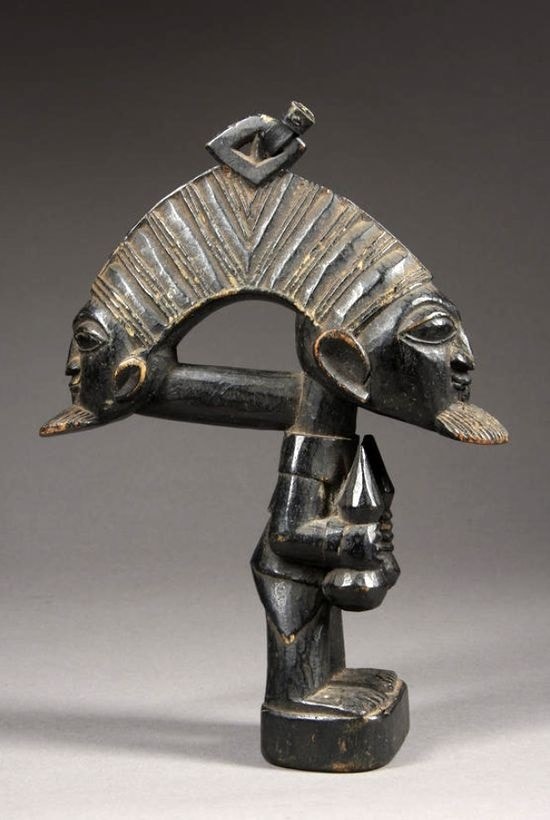Exploring the cultural and spiritual symbolism of Eshu, the Yoruba deity who bridges heaven and earth
The sculpture in question represents Eshu, also known as Elegba, one of the most complex and revered deities in the Yoruba religion. Eshu occupies a vital role in Yoruba cosmology as both a trickster spirit and a divine messenger, embodying the balance between chaos and order, mischief and wisdom, justice and communication.
Eshu: The Divine Messenger
In Yoruba belief, Eshu serves as the intermediary between humans and the gods (Orishas). No prayer, offering, or ritual can reach the higher deities without passing through him. This role as a cosmic gatekeeper makes Eshu indispensable to the Yoruba spiritual system.
He ensures that divine messages are properly delivered and that sacrifices reach their intended recipients. However, if ignored or disrespected, he can also disrupt communication, causing confusion or misfortune. For this reason, Yoruba devotees always begin their rituals by honouring Eshu first, a practice that underscores his spiritual authority.
A Trickster and Guardian
Eshu’s personality embodies duality—he is both a protector and a provocateur. Known as the trickster god, he uses cleverness and unpredictability to teach lessons about morality, fairness, and human nature. His tricks are never random; they serve to remind people of the consequences of dishonesty, pride, or neglect of spiritual obligations.
Despite his reputation for mischief, Eshu is a benevolent guardian who defends justice and ensures balance between good and evil. He is particularly associated with communication, truth, and reciprocity, symbolising the complex moral fabric of Yoruba philosophy, where opposites coexist in harmony.
Eshu in Yoruba Art
The Yoruba people of Southwestern Nigeria, primarily in states such as Oyo, Osun, Ogun, and Lagos, have a long-standing artistic tradition where spirituality and aesthetics merge. Sculptures of Eshu are a crucial part of this tradition, often made from wood, metal, or clay, and adorned with symbolic motifs such as cowrie shells, beads, and iron rods.
Eshu sculptures are typically characterised by exaggerated facial features, representing his watchfulness and ability to perceive hidden truths. The dynamic poses and intricate designs reflect his vibrant personality and spiritual energy.
Shrines dedicated to Eshu are often placed at crossroads, home entrances, and marketplaces—spaces where boundaries are crossed and communication occurs. These locations emphasise his role as a deity of transitions, movement, and choices.
Cultural Symbolism and Global Influence
Eshu’s influence extends beyond the Yoruba homeland. Through the transatlantic slave trade, the worship of Eshu spread across the Americas and the Caribbean, where he evolved under various names, such as Eleggua in Cuba’s Santería religion, Legba in Haitian Vodou, and Exu in Brazilian Candomblé.
Despite the different contexts, his essence remains consistent: Eshu is the divine messenger who mediates between the spiritual and physical worlds, ensuring that balance and justice prevail.
His adaptability across cultures demonstrates the resilience of Yoruba spirituality and its ability to evolve without losing its core principles.
Modern Interpretations
Contemporary Yoruba and Nigerian artists continue to reinterpret Eshu’s image through sculpture, painting, and performance. Artists such as Ajibike Ogunyemi of Osogbo—a member of the New Sacred Art movement—draw inspiration from deities like Eshu to merge traditional spirituality with modern creativity.
Through such artistic expressions, Eshu remains not only a religious figure but also a symbol of cultural identity, resilience, and creative expression.
Moral and Cultural Reflection
Eshu’s story serves as a profound reminder that communication, justice, and wisdom often require embracing both light and shadow. His trickster nature teaches that life’s challenges are tests of character, and true understanding often comes through confusion and correction.
In Yoruba thought, Eshu’s duality symbolises the reality of existence—nothing is purely good or evil, and every action carries consequences. Respecting Eshu means respecting the delicate balance that sustains both the spiritual and physical worlds.
References:
Lawal, Babatunde. The Gelede Spectacle: Art, Gender, and Social Harmony in an African Culture. University of Washington Press, 1996.
Drewal, Henry John. Yoruba Ritual: Performers, Play, Agency. Indiana University Press, 1992.
Smithsonian National Museum of African Art archives on Yoruba sculptures.
FOLLOW US ON:
FACEBOOK
TWITTER
PINTEREST
TIKTOK
YOUTUBE
LINKEDIN
TUMBLR
INSTAGRAM































